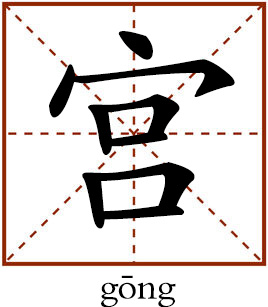Palace

This character usually refers to palaces or the womb. It also indicates empresses and imperial concubines in ancient times.
满城春色宫墙柳
mǎn chéng chūn sè gōng qiáng liǔ
Man cheng refers to the whole city. Chun is spring and se scenery. Gong qiang refers to the palace walls and liu willows.
This is a line from the poem, “Phoenix Hairpin,” by the Song poet Lu You (1125–1210). In the spring of 1155, the poet met his ex-wife Tang Wan in the Shen Garden (in present-day Shaoxing, Zhejiang Province), whom he loved dearly, yet was compelled to divorce. Tang offered him gold-branded wine and he wrote this poem to which she wrote another in reply. “Pink tender hand,/yellow-corded wine,/ city crammed with spring hues,/ willow by garden wall:/ east wind hateful,/ the one I loved cold —/ a heart all sadness,/ parted how many years?/ Wrong! Wrong! Wrong!/ Spring as always,/ Someone grown needlessly thin,/ Red tear stains wet the kerchief,/ soaking through mermaid gauze./ Peach petals falling,/ Stillness of a pond pavilion:/ Mountain-firm vows go on forever,/But a letter would be useless now -/ Don’t don’t don’t” (trans. Burton Watson).
The first three lines reflect Lu’s encounter with Tang and her new husband during a visit to the Shen Garden seven years after their divorce. Tang receives permission from her husband to have contact. Therefore, Lu has a chance to have a drink with Tang, which makes him so emotional that he writes this poem on the wall of the garden immediately. The “east wind” is a metaphor for Lu’s disapproving family that tears them apart. The triple “wrong” may indicate that it is wrong for them to end up apart; wrong of his mother to drive Tang away; and wrong of himself to obey his mother.
The last half of the poem depicts that Tang looks drawn and thin, suggesting that she hasn’t recovered from the sorrow of divorce either. The “Mountain-firm vows” represents that Lu’s love for Tang has never changed, while the “letter” indicates that he cannot express his love for Tang any more. The triple “don’t” indicates that Lu is trying to persuade himself to let it go, because there is no possibility of their being together again. This reveals Lu’s deep agony and hopelessness.
Tang died, many say of a broken heart, a year after this brief reunion.
edited by REN GUANHONG
